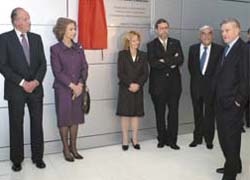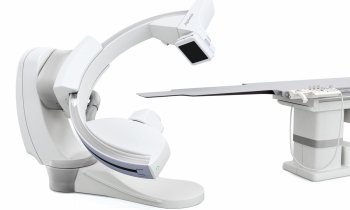The Spanish National Centre for Cardiovascular Research
The King and Queen of Spain, accompanied by the Minister of Health and over 100 institutional and corporate authorities, inaugurated the new Madrid headquarters of the country's National Centre for Cardiovascular Research in February.
Dr Eduardo de la Sota, our correspondent in Spain, reports on the structure and aims of this research enterprise
The objective of the CNIC is to lead cardiovascular research in Spain and establish itself as a leading international centre.

The objective of the CNIC is to lead cardiovascular research in Spain and establish itself as a leading international centre. The scientific management of the CNIC is under the direction of Spanish born Dr Valentin Fuster who serves the Mount Sinai Medical Centre as Director of the Heart and Cardiovascular Institute (New York), and is President of the World Heart Federation. Sixteen universities throughout the world have granted Dr Fuster ‘honoris causa’. His publications include over 400 articles on the coronary artery disease, atherosclerosis and thrombosis.
Discussing the CNIC, Dr Fuster said: ‘Today, research is a synonym of well-being and progress for any developed country, but even more so in the case of biomedical research, where the knowledge gained is translated into a immediate, substantial improvement in the health and quality of life of citizens. In this respect, the CNIC has the major challenge of establishing a new two-way translational research model, which enables both the application of basic knowledge to the diagnosis, treatment, prognosis or prevention of cardiovascular diseases and which contributes to answering the scientific questions arising in the daily clinical practice at the patient’s bedside.’
Research at the CNIC falls into these categories:
• Vascular Biology and Inflammation
• Atherothrombosis and Cardiovascular Imaging
• Regenerative Cardiology
• Cardiovascular Developmental Biology
• Cardiovascular Epidemiology and Population Genetics
• Translational Cardiovascular Research of Novel Technologies and Therapeutics.
Financing
The CNIC has been designed as a flexible entity, in terms of its organisation as well as financing, with significant participation from the private sector. Through the ProCNIC foundation, and in conjunction with the objectives of the Government’s Programa Ingenio 2010 (2010 ‘Talent Development Programme’), thirteen of the principal Spanish companies (Acciona, Banco Santander, BBVA, Endesa, Fadesa, Fundación Abertis, Fundación Ramón Areces, Gas Natural, Grupo Prisa, Inditex, La Caixa, Repsol YPF and Telefónica) have agreed to participate in the ambitious CNIC project. This corporate commitment, which is open to new companies, began last December after the Prime Minister, José Luis Rodriguez Zapatero, signed a co-operation and constitution agreement for the Pro CNIC foundation, which will contribute 100 million euros up to 2012.
Headquarters in Madrid
Spread over 23,000 m2 the new building, costing over 50 million euros, has the capacity to house 300 scientists. From 2000, through an agreement signed with the Ministry of Health, the pharmaceutical industry has made several contributions to this expenditure.
The building has four floors above ground and three below. The laboratories, which occupy most of the Centre, are equipped with services and facilities necessary to perform world-class biomedical research, and provide an open environment designed to encourage maximum collaboration and communication.
Collaborations
The following institutions are involved:
• Consejo Superior de Investigaciones Científicas, Instituto de Biomedicina de Valencia
• El parque científico de Madrid
• The European Molecular Biology Laboratory
• The Flanders Interuniversity Institute for Biotechnology
• La Fondazione Centro San Raffaele del Monte Tabor
• Fundación Bamberg
• Fundación Genoma España
• Fundación para la investigación biomédica del Hospital Ramón y Cajal
• Instituto de Salud Carlos III
• Lacer, S.A.
• Universidad Complutense de Madrid
• Universidad de A Coruña
• Universidad de Salamanca
• Universidad de Valencia
• University of Cincinnati
• The University of Yale
A pool of researchers
One of the Key objectives of the CNIC will be to create a strong pool of multidisciplinary researchers. Therefore, as well as attracting the best cardiovascular specialists, the centre will pay considerable attention to training young scientists, with seven pioneering projects in Spain that will be carried out jointly with the Instituto de Salud Carlos III, an entity affiliated with the Ministry of Health. Interestingly, the CNIC international programme is intended for young doctors from any of the biomedical areas and includes training abroad as well as the possibility of returning to the Spanish centre after the training period. Specialists who have finished their MIR (specialty) training in the cardiovascular field will be offered the possibility of participating in a translational research project designed by de CNIC, which lasts between 12 and 24 months, together with the possibility of collaborating with the Mount Sinai Hospital in New York.
Technical units
Currently, the CNIC has four technical units, with the possibility of more in the future. Each unit maintains advanced facilities in their specialist area, and is set up to incorporate new technologies as they emerge. Researchers can thus take advantage of the latest technologies without having to divert their own resources.
As independent units, the services are equally available to all users, and the economies of scale and competitiveness with external suppliers help to stretch research budgets.
Technologies covered:
• Cytometry
• Proteomics
• Genomics.
The CNIC - general information
Address: Centro Nacional de Investigaciones Cardiovasculares, Melchor Fernández Almagro,3
28.029 Madrid, Spain.
Telephone: (+34) 91 453 12 00
Fax: (+34) 91 453 12 45. E-mail: cnic@cnic.es. Website: www.cnic.es
30.08.2006











